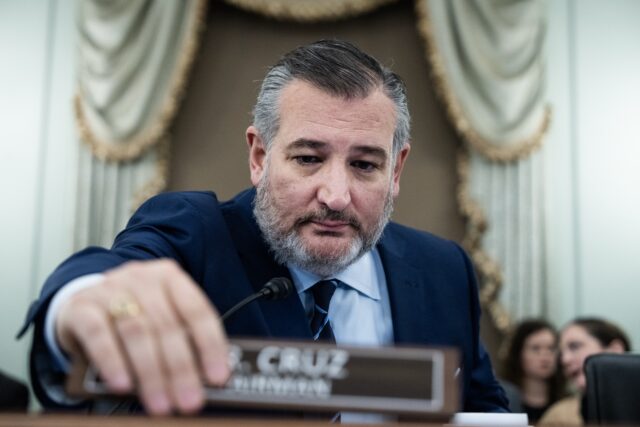ARSTECHNICA.COM
Senate passes “cruel” Republican plan to block Wi-Fi hotspots for schoolkids | Senate vote nullifies FCC hotspot-lending program for kids without broadband.
Hotspot lending on life support
Senate passes “cruel” Republican plan to block Wi-Fi hotspots for schoolkids
Senate vote nullifies FCC hotspot-lending program for kids without broadband.
Jon Brodkin
–
May 8, 2025 1:26 pm
|
43
Senate Commerce Committee Chairman Ted Cruz (R-Texas) at a hearing on Tuesday, January 28, 2025.
Credit:
Getty Images | Tom Williams
Senate Commerce Committee Chairman Ted Cruz (R-Texas) at a hearing on Tuesday, January 28, 2025.
Credit:
Getty Images | Tom Williams
Story text
Size
Small
Standard
Large
Width
*
Standard
Wide
Links
Standard
Orange
* Subscribers only
Learn more
The US Senate today voted along party lines to kill a Federal Communications Commission program to distribute Wi-Fi hotspots to schoolchildren, with Democrats saying the Republican-led vote will make it harder for kids without reliable Internet access to complete their homework.
The Senate approved a Congressional Review Act (CRA) resolution to nullify the hotspot rule, which was issued by the Federal Communications Commission in July 2024 under then-Chairwoman Jessica Rosenworcel. The program would be eliminated if the House version passes and President Trump signs the joint resolution of disapproval.
Senator Ted Cruz (R-Texas) announced the plan in January, saying the FCC program would "imped[e] parents' ability to decide what their kids see by subsidizing unsupervised access to inappropriate content." He also alleged that the hotspot program would shift control of Internet access from parents to schools and thus "heightens the risk of censoring kids' exposure to conservative viewpoints."
The Rosenworcel FCC's rule expanded E-Rate, a Universal Service Fund program, allowing schools and libraries to use E-Rate funding to lend out Wi-Fi hotspots and services that could be used off-premises. The FCC rule was titled, "Addressing the Homework Gap through the E-Rate Program," and the hotspot lending program was scheduled to begin in funding year 2025, which starts in July 2025.
Markey: “Cruel and shortsighted decision”
Today's Senate vote on the resolution of disapproval was 50–38. There was a 53–47 vote on Tuesday that allowed the Senate measure to proceed to the final step. Sen. Richard Blumenthal (D-Conn.) said on Tuesday that "this resolution would prevent millions of students, educators, and families from getting online."
"It would be a disgrace if we deprive those students and their families of this vast resource, of literally life-changing access to a really necessary service that helps them not just now but throughout their futures," Blumenthal said. "We ought to expand Internet access, not constrict it. We ought to be enhancing it, not cutting it off."
Blumenthal pointed out that under a joint resolution of disapproval, the FCC is forbidden to adopt a similar rule in the future. "I have to ask, really? Are schools and teachers crying out to repeal this rule? Really? No, they are not. How does this proposal make any sense for them or for families? For the parents? For the community? It makes no sense," Blumenthal said.
Sen. Edward Markey (D-Mass.) called the Republican move "a cruel and shortsighted decision that will widen the digital divide and rob kids of the tools they need to succeed."
FCC’s new chair opposed lending program
The FCC previously distributed Wi-Fi hotspots and other Internet access technology through the Emergency Connectivity Fund (ECF) that was authorized by Congress in 2021. After that program was axed last year, the FCC responded by adapting E-Rate to include hotspot lending.
FCC Chairman Brendan Carr, who was elevated to the agency's top spot by Trump in January, voted against the program last year. Carr said in his dissent that only Congress could decide whether to revive the hotspot lending.
"Now that the ECF program has expired, its future is up to Congress," he said at the time. "The legislative branch retains the power to decide whether to continue funding this Wi-Fi loaner program—or not. But Congress has made clear that the FCC's authority to fund this initiative is over."
Overall E-Rate funding is based on demand and capped at $4.94 billion per year. Actual spending for E-Rate in 2023 was $2.48 billion. E-Rate and other Universal Service Fund programs are paid for through fees imposed on phone companies, which generally pass the cost on to consumers.
The House version of the measure to kill the lending program was introduced by Rep. Russ Fulcher (R-Idaho). "E-Rate was designed to ensure schools and libraries have the connectivity they need to educate and serve their communities, not to create a backdoor entitlement program that stretches beyond the law's clear boundaries," Fulcher said in February when he filed the resolution. "The FCC cannot be allowed to unilaterally interpret the law in a way that fits their political agenda. The expansion of this program under the Biden administration was a blatant example of overreach that is not only unlawful but also disregards congressional intent."
Jon Brodkin
Senior IT Reporter
Jon Brodkin
Senior IT Reporter
Jon is a Senior IT Reporter for Ars Technica. He covers the telecom industry, Federal Communications Commission rulemakings, broadband consumer affairs, court cases, and government regulation of the tech industry.
43 Comments
